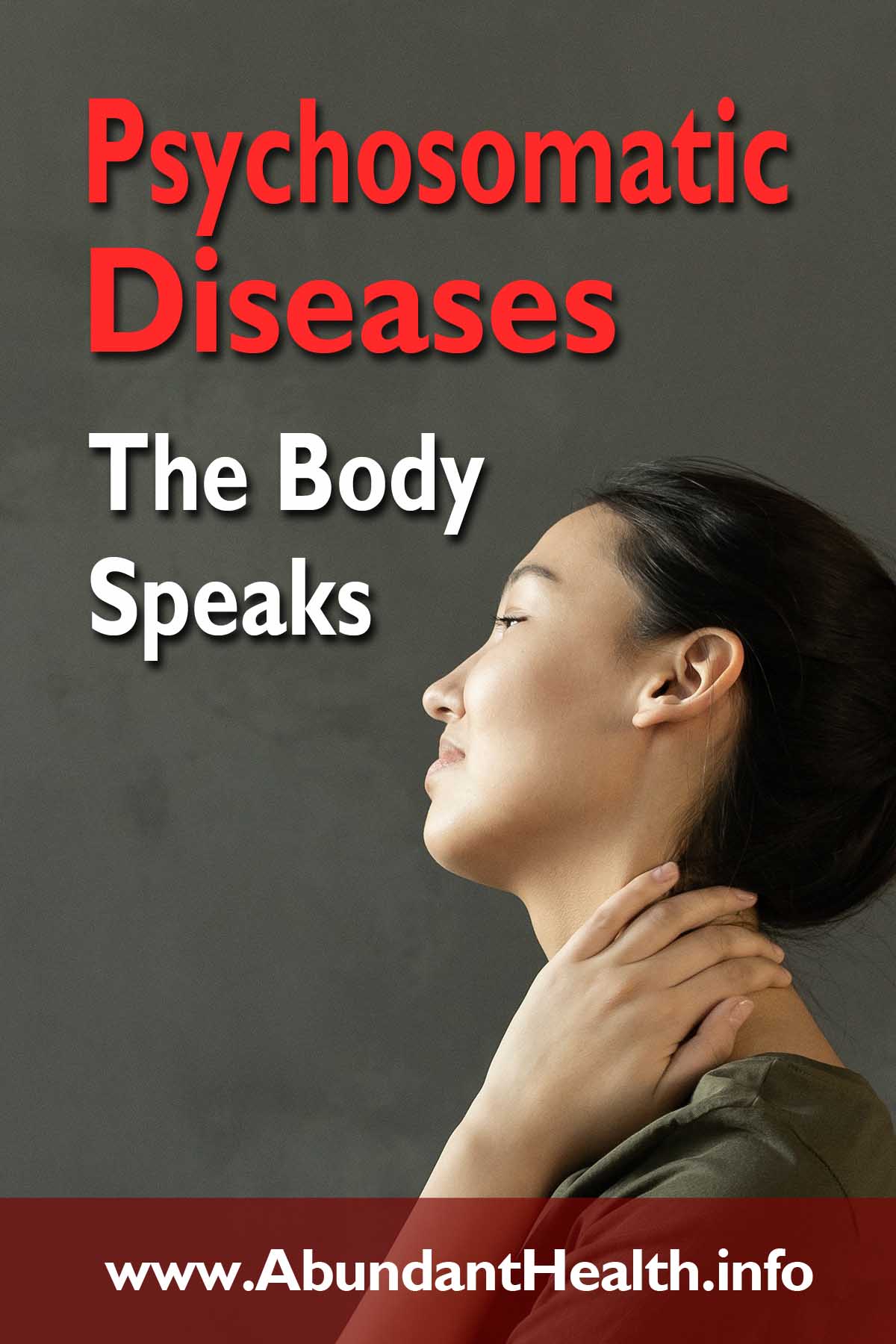Body and mind always work together. You have a suffering in your body, your mind participates. You have suffering in your mind, your body participates. Today we want to understand psychosomatic diseases, how the body and mind work together in health and illness, and how one affects the other.

I would like to start by quoting some interesting phrases:
The sympathy which exists between the mind and the body is very great. When one is affected, the other responds.1)Ellen G. White. Medical Minstry p. 105
That´s an interesting concept! Look at the next text:
Great wisdom is needed by the physicians at the Institute in order to cure the body through the mind. But few realize the power that the mind has over the body. A great deal of the sickness which afflicts humanity has its origin in the mind, and can only be cured by restoring the mind to health.2)Counsels on Health p. 349
And this author still says the following:
Sickness of the mind prevails everywhere. Nine tenths of the diseases from which men suffer have their foundation here.3)Ellen G. White. Mind, Character and Personality Vol. 1 p. 59
Isn’t this interesting? According to this text nine out of ten illnesses originate in the mind. Is this an exaggeration? Dr. Herbert Benson, a clinical physician at Harvard University in the United States says the following:
60% to 90% of patients who seek doctors at the (outpatient) clinic have their illnesses due to physical and mental stress. These are people who have had physical symptoms as a result of social and emotional problems. The average could be 75%.4)Herbert Benson, Harvard University, “Timeless Healing – The Power and Biology of Belief”, 1998
An he goes on to say:
Emotion plays a more crucial role in our physiology than most of us can understand.
According to him, feelings and emotion influence physiology, and how the body works.
Hippocrates, the so-called father of medicine, a Greek physician who lived between 460 and 370 BC, said something interesting that relates to psychosomatic diseases:
It’s far more important to know what person the disease has than what disease the person has.
Interestingly, he recommended for example that people with asthma learn to better express their anger, in addition to other procedures that he prescribed. So it is more important to try to understand what kind of person has a certain disease, than what disease that person has. Of course, this doesn’t diminish the importance of a proper diagnosis. The diagnosis needs to be made by a doctor, so that the treatment is well indicated. But what Hippocrates was wisely trying to say, is that the professional who seeks a complete view of the person with a certain illness, can achieve better results in the treatment. So a well rounded view of the patient means researching the physical, mental, spiritual and social factors in that person’s life, rather than just focusing on that isolated symptom.

It’s important to understand that we don’t get sick by compartments. The body affects the mind and the mind affects the body. Nothing is just physical and nothing is just psychological. In the development of a disease, as well as in health, there is a combination of factors in the individual’s lifestyle, which has to do with how you think, how you feel, how you express your feelings, it has to do with the way you deal with people, it has to do with your diet, whether you exercise or not, the quality of your sleep, the stress you experience at work, whether you live in a big city or a small town, it’s about all the aspects of your lifestyle.
When you have a physical symptom, it can be headache, dizziness, back pain, among many others, and you go to a medical appointment, do complementary tests, blood tests, urine and stool tests, X-ray, EEG, CT scan, magnetic resonance, ultrasound, and the doctor says you have nothing, that the results are normal, but you still have that symptom that motivated your consultation, you are dealing probably with a psychosomatic symptom, which can develop into a psychosomatic disease.
What is a Psychosomatic Disease
A psychosomatic disease is one that manifests itself in the body with physical or functional symptoms and injuries, but whose main cause originates in the mind. That means the main cause comes from emotional conflicts, psychological conflicts and mental stress. This is different from somatization, because in somatization there is no detectable disease process, either by a medical exam or a lab test. So when a person has a lot of emotional stress, he can manifest some of that stress in his body, because the body is a helper to the mind and both work in an indivisible and inseparable union. In this sense, we can say that every disease, regardless of its origin, is to a certain degree psychosomatic.
The body and mind work in harmony in such a way that when something is burdening the mind like nervous tension, sadness, excessive anxiety, it is as if the body says to the mind: Do you need help? So the mind says: Yes help me, because it is hard to deal with this suffering here. Then we throw part of our tension onto the body, and the body starts to show psychosomatic symptoms.
Each person will have the manifestation of emotional distress in one or more than one of what we call a shock organ. The shock organ is the part of your body that is most sensitive to emotional stressors. For some people, the shock organ may be the stomach, hence when there is too much stress, too much tension at work or in the family, these people feel, for example, a burning sensation in the stomach area. For others, the shock organ could be the immune system. A person experiencing a lot of tense relationships, a lot of stress, may have frequent infections, develop an autoimmune disease, who knows. In other individuals, the shock organ can be the muscular system, for example, and in the face of life pressures, these people feel muscular pain. According to studies by Dr. Dean Ornish, a cardiologist at the University of California in San Francisco, he said:
People with a heart attack have a fourfold risk of dying within six months if they remain depressed and alone.5)Dean Ornish, Saving Your Heart, 2002
He is saying here, that people who have already had the attack but survived, if they remain alone, isolated, they have a much greater risk of dying. And he cites a study at the Case Western Reserve University, and in that study he verified the following:
They surveyed 10,000 married men and found that those who answered yes to the question, “Does your wife express love to you?” had significantly less angina.6)Dean Ornish, Salvando o Seu Coração, 2002
Years ago there was a book that was a bestseller in Brazil. That’s the title of the book: “Whatever it is”. It was written by a woman, an executive secretary who had a daughter and she was a go-getter, very proactive, very active in life to take care of her daughter, excel at work, be a high-profile professional in the company, then she had breast cancer. First she was stunned: How can that happen to me, a strong woman, so powerful, has breast cancer! She started researching what breast cancer is, and wrote this book: “Whatever it is”. A book where she opens her heart, opens her life, even private things in her life, and she says: “The cancer did not come to kill me, the cancer was a beacon, a red light ascending in my life, saying: Hey, stop, stop to reevaluate your life.”

I even got in touch with her at this time, and we sat together at a bar in Rio de Janeiro to talk about this subject of mind and body and the relationship to psychosomatic diseases. So she explained it this way: “We have to learn to look at the disease as an alarm. The symptom is an alarm, the symptom is talking to you. It’s like when you have a car that you’re driving, and a red light is lighting up on the dashboard, is that red light a good thing or a bad thing? Well, it has both sides, it’s bad because you have a problem with your car, but it’s good because it’s warning you.”
So when you have any symptoms, of course you’re going to seek medical help, consultations, tests, all of that, but if you went to the doctor, you did evaluations, did the tests, and he says you have nothing, you’re fine, but you still have that symptom with that same kind of pain, so you need to start thinking about what’s going on with your emotional life. What will you need to do to alleviate the emotional tension and stress? As I explained, the mind always works hand in hand with the body, and often when you’re not ready to deal with the emotional pain, give it a name, face it head-on, your body starts to absorb, because you’re asking for it, you’re saying: I can’t handle dealing with this emotional pain, I can’t handle dealing with this loss, with this frustration, so the body comes in to help to alleviate this load.
The Power of the Mind
The way you think influences your body. This very simple statement shows just that:
If your mind is impressed and fixed that a bath will injure you, the mental impression is communicated to all the nerves of the body. The nerves control the circulation of the blood; therefore the blood is, through the impression of the mind, confined to the blood vessels, and the good effects of the bath are lost. All this is because the blood is prevented by the mind and will from flowing readily and from coming to the surface to stimulate, arouse, and promote the circulation.
For instance, you are impressed that if you bathe you will become chilly. The brain sends this intelligence to the nerves of the body, and the blood vessels, held in obedience to your will, cannot perform their office and cause a reaction after the bath.7)Ellen G. White. Mind, Character and Personality Vol. 2 p. 397, 398
That’s a very interesting statement! It is saying that the blood is impaired to circulate, because the mind is in emotional strain because of the way you think. Now the way you think then influences your body? That is what is being stated there. Now look at this other text that shows that the way you feel affects your body. It says:
It is the duty of everyone to cultivate cheerfulness instead of brooding over sorrow and troubles. Many not only make themselves wretched in this way, but they sacrifice health and happiness to a morbid imagination. There are things in their surroundings that are not agreeable, and their countenances wear a continual frown that more plainly than words expresses discontent. These depressing emotions are a great injury to them healthwise, for by hindering the process of digestion they interfere with nutrition.8)Ellen G. White. Mind, Character and Personality Vol. 1 p. 62, 63
Very interesting, depressing emotions harming nutrition! Years ago a Nobel Prize winner in medicine showed in his scientific work with his team that there is a connection between cells of the central nervous system and immune cells.
Dr. Wildemann and his collaborators from the Stress Lab at the University of Arizona, proved that people experiencing significant losses, such as the death of their spouse, can experience several months of immune system deficiency resulting from this sadness. He explains in the study that some defense cells, such as natural killer cells, T and B lymphocytes, may become reduced or less active in their work to fight viruses and bacteria, because sadness affects immunity, it affects these defense cells.
Perhaps you have heard of an elderly person who was in good health and a few months after the death of his husband or wife, he himself had a major infection and died too. You surely have heard of such a case, it’s not uncommon. The old couple lives together and they’re fine, but suddenly one gets sick and then the other one that was healthy, but after the death of that dear one, within six months he dies too. Because sadness undermined the strength of that individual’s immunology, so a virus or bacteria took advantage of the situation and caused a serious illness.

So it seems that the more a person has difficulties becoming aware of their emotions, especially painful or unpleasant emotions, the more likely they are to present psychosomatic symptoms, because the body absorbs such feelings that the person feels unfit to deal with in a conscious level. This means that the more a psychosomatic symptom is buried in the body, the further a person is from the truth about the repressed and somatized feeling, or about those painful thoughts that the person doesn’t want to think about at that moment.
Dr. Diana Fosha from Adelphi University in New York says that for every type of emotion there is a visceral component, that is, a feeling always expresses itself in some organ in the body. I’ve already talked about shock organs here, so if you have difficulty expressing anger, it can come out in form of asthma or high blood pressure. People who have difficulty expressing any feelings, may present for example constipation. Perfectionists and stressed individuals can have a lot of migraine headaches. Some people with a tendency to repress their emotions for many years may facilitate their body to develop cancer, according to studies by scientists such as Dr. Bernie Siegel, Lawrence LeShan and the Simonton scientist couple.
Of course I’m not saying and neither are they, that the cause of cancer is an emotion. In fact, they explain that unresolved conflicts or major losses, can be factors that affect immunity and favor the emergence of cancer, when the person already had other factors that induce the mutation of a normal cell to a cancer cell.
A person with a lot of difficulty to cry, according to some scientists, may cry through the skin, through dermatological lesions, which produces a type of secretion. Individuals who repress their feelings a lot, they tend to have degenerative diseases such as cancer, diabetes, multiple sclerosis and other pathologies, while more explosive people tend to have other diseases such as heart attack or stroke. It’s like the more melancholic, introverted people they implode and the more short tempered people they explode, so the diseases are more cardiovascular for the explosive and they are more degenerative in the more introverted people. It’s common for people who develop fibromyalgia, for example, to take exaggerated responsibilities in the family. I’ve seen a lot of people with fibromyalgia, and I realized that in all of them there was a behavioral characteristic of exactly that: carrying the piano for everyone.
Psychological disorders are not weakness or lack of faith if you have lived or are experiencing major stresses in your life. Mental sufferings such as strong anguish, deep sadness, excessive fear are expressions of suffering, which often manifests through the body. These are so called psychosomatic disorders, which are defenses used by the body to relieve the mind. If you have physical symptoms, if you’ve had several evaluations with different doctors and they all say you have nothing, because no diagnosis was found and your exams are normal, you need to start to think whether there is something unresolved in your life, in your emotional life, in your relationships with people, are you guarding some resentment, do you need to resolve an issue with someone who has been eating you from the inside for many years? If you have some repressed emotions, or one of those situations I talked about, it might manifest itself in your body. You may also consider that a professional psychological evaluation may be needed. It may depend on the level of suffering you are having.

Sometimes emotional problems get resolved with life. A friend of mine, a psychoanalyst, once said an interesting phrase: “Life is therapeutic”, meaning life, the events of life, they teach us many things by themselves, and can help us to achieve healing from some situations.
Sometimes life doesn’t solve everything, so we need some technical help. Don’t suffer without taking an attitude to improve, because actually health, for you to develop health, it depends on you to practice some habits, it depends on you to improve your lifestyle in relation to food, in your thinking patterns, in the relationship with people, your sleep, your physical exercise, but it also depends on the attitudes you take, on you assuming responsibility for taking good care of your body and mind.
So it’s important that you do something for yourself instead of always waiting for people to do something for you, or even waiting that the doctor will cure you. The doctor does not cure people, the doctor indicates some paths to health, sometimes they prescribe a medicine that will be temporary to alleviate a symptom, that suffering you are going through, but there are attitudes you take in life, there are decisions you make to take better care of your health and your mind, that will determine whether you are going to take the path of health or the path of illness. Professor Dr. Adalberto Barreto, who works with community therapy, said:
When the mouth shuts up, the organs speak, and when the mouth speaks, the organs heal.
Look how interesting it is, showing the importance of talking, of letting off steam, so that you don’t get somatized, so that you don’t keep swallowing things, without putting a limit, and you end up suffering on your body. Make the necessary changes in your thoughts and emotions for you to have a better life and health!

Stay Always Up to Date
Sign up to our newsletter and stay always informed with news and tips around your health.

Dr. Cesar Vasconcellos de Souza is working as a psychiatrist and international speaker. He is author of 3 books, columnist of the health magazine “Vida e Saúde” for 25 years, and has a regular program on the “Novo Tempo” TV channel.
References
| ↑1 | Ellen G. White. Medical Minstry p. 105 |
|---|---|
| ↑2 | Counsels on Health p. 349 |
| ↑3 | Ellen G. White. Mind, Character and Personality Vol. 1 p. 59 |
| ↑4 | Herbert Benson, Harvard University, “Timeless Healing – The Power and Biology of Belief”, 1998 |
| ↑5 | Dean Ornish, Saving Your Heart, 2002 |
| ↑6 | Dean Ornish, Salvando o Seu Coração, 2002 |
| ↑7 | Ellen G. White. Mind, Character and Personality Vol. 2 p. 397, 398 |
| ↑8 | Ellen G. White. Mind, Character and Personality Vol. 1 p. 62, 63 |
I have been following all your wonderful advice throughout the pandemic and have been richly blessed.
I’m crying with tears of joy Thankyou for bringing to my attention the connection of mind body soul. When the mouth is quite the body speaks. So we must resolve issues or they internalize into physical body issues. The mind and emotions work hand in hand with the body and soul. This is the future not medicine we have work to do. Self love self care self healing.